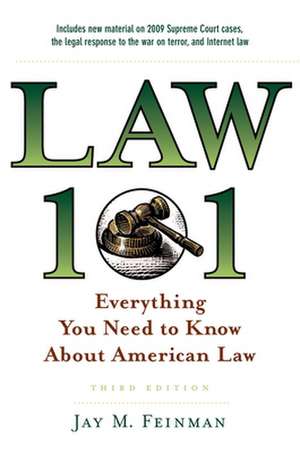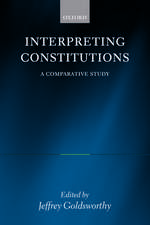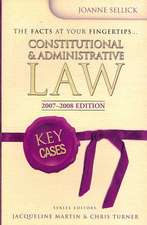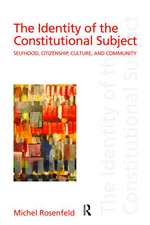Law 101: Everything You Need to Know About American Law
Autor Jay M. Feinmanen Limba Engleză Hardback – 30 iun 2010
| Toate formatele și edițiile | Preț | Express |
|---|---|---|
| Hardback (2) | 150.64 lei 41-52 zile | +69.88 lei 10-14 zile |
| Oxford University Press – 20 iun 2023 | 160.82 lei 10-16 zile | +69.88 lei 10-14 zile |
| Oxford University Press – 30 iun 2010 | 150.64 lei 41-52 zile |
Preț: 150.64 lei
Nou
Puncte Express: 226
Preț estimativ în valută:
28.83€ • 29.99$ • 23.80£
28.83€ • 29.99$ • 23.80£
Carte tipărită la comandă
Livrare economică 11-22 aprilie
Preluare comenzi: 021 569.72.76
Specificații
ISBN-13: 9780195395136
ISBN-10: 0195395131
Pagini: 384
Dimensiuni: 162 x 241 x 34 mm
Greutate: 0.64 kg
Ediția:Third Edition
Editura: Oxford University Press
Colecția OUP USA
Locul publicării:New York, United States
ISBN-10: 0195395131
Pagini: 384
Dimensiuni: 162 x 241 x 34 mm
Greutate: 0.64 kg
Ediția:Third Edition
Editura: Oxford University Press
Colecția OUP USA
Locul publicării:New York, United States
Notă biografică
Jay M. Feinman serves as Distinguished Professor of Law, Rutgers University School of Law, Camden. He is the author of five previous books, including 1001 Legal Words and Un-Making Law: The Conservative Campaign to Roll Back the Common Law.
Recenzii
Praise for the previous editions:
An engaging introduction to just about every aspect of law.
All the benefits of that first year of law school without the tedium, the terror, and the sleep deprivation...These legal lessons are presented in a style nearly always engaging and very often humorous.
An entertaining and informative introduction to the law...For journalists, those interested in the law, and fans of television law dramas, this book should be required reading.
A layperson's introduction to the legal subjects that assault every first-year law student. From constitutional law to contracts to Dickensian procedures that guide civil suites, the book gives an approachable overview of the cases and concepts that combine to form our legal system.
Though a book is aimed at laypersons, it offers a good refresher course to update legal practitioners and paraprofessionals in areas where they do not specialize. A good read overall for those interested in the law.
Law 101 attempts to teach you how to think like a lawyer
This basic text offers nonlawyers a concise, accessible overview of topics typically introduced in the first year of law school. Feinman, a law professor at Rutgers, cites seminal cases to highlight key concepts in the fields of constitutional law, civil procedure, torts, contracts, property, criminal law and criminal procedure. He does not minimize the actual complexity of these subjects, conceding variously that contract law has "tormented the most students," property law "most irritates students," conflicts of law "tortures students" and civil procedure is "the most alien." Nevertheless, he distinguishes his book from the various how-to-be-your-own-lawyer manuals on the market: 'This one is fun to read.' ...But many readers, particularly those contemplating law school, will find this a painless introduction to American legal theory and practice.
Many readers, particularly those contemplating law school, will find this a painless introduction to American legal theory and practice.
Feinman's style makes for easy reading, and Law101 is chock full of analyses, anecdotes, examples, questions, and legal reasoning set out in lay terms. Overall, the book provides an excellent explanation of what American law is, and it frequently suggests ways in which it might be improved.
Academic law libraries and law libraries serving the public, academic libraries serving undergraduate students, and public libraries will find this book a good addition to their collections. This book is also a good read for students thinking of attending law school and for those persons who have been away from the practice of law but are interested in getting reacquainted with its basics.
An engaging introduction to just about every aspect of law.
All the benefits of that first year of law school without the tedium, the terror, and the sleep deprivation...These legal lessons are presented in a style nearly always engaging and very often humorous.
An entertaining and informative introduction to the law...For journalists, those interested in the law, and fans of television law dramas, this book should be required reading.
A layperson's introduction to the legal subjects that assault every first-year law student. From constitutional law to contracts to Dickensian procedures that guide civil suites, the book gives an approachable overview of the cases and concepts that combine to form our legal system.
Though a book is aimed at laypersons, it offers a good refresher course to update legal practitioners and paraprofessionals in areas where they do not specialize. A good read overall for those interested in the law.
Law 101 attempts to teach you how to think like a lawyer
This basic text offers nonlawyers a concise, accessible overview of topics typically introduced in the first year of law school. Feinman, a law professor at Rutgers, cites seminal cases to highlight key concepts in the fields of constitutional law, civil procedure, torts, contracts, property, criminal law and criminal procedure. He does not minimize the actual complexity of these subjects, conceding variously that contract law has "tormented the most students," property law "most irritates students," conflicts of law "tortures students" and civil procedure is "the most alien." Nevertheless, he distinguishes his book from the various how-to-be-your-own-lawyer manuals on the market: 'This one is fun to read.' ...But many readers, particularly those contemplating law school, will find this a painless introduction to American legal theory and practice.
Many readers, particularly those contemplating law school, will find this a painless introduction to American legal theory and practice.
Feinman's style makes for easy reading, and Law101 is chock full of analyses, anecdotes, examples, questions, and legal reasoning set out in lay terms. Overall, the book provides an excellent explanation of what American law is, and it frequently suggests ways in which it might be improved.
Academic law libraries and law libraries serving the public, academic libraries serving undergraduate students, and public libraries will find this book a good addition to their collections. This book is also a good read for students thinking of attending law school and for those persons who have been away from the practice of law but are interested in getting reacquainted with its basics.











